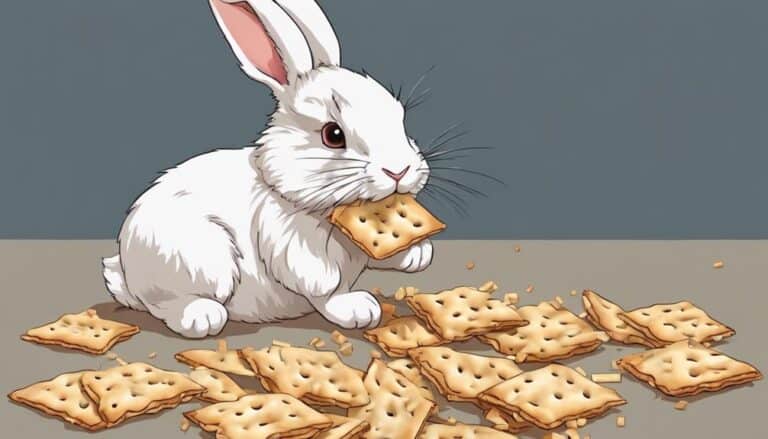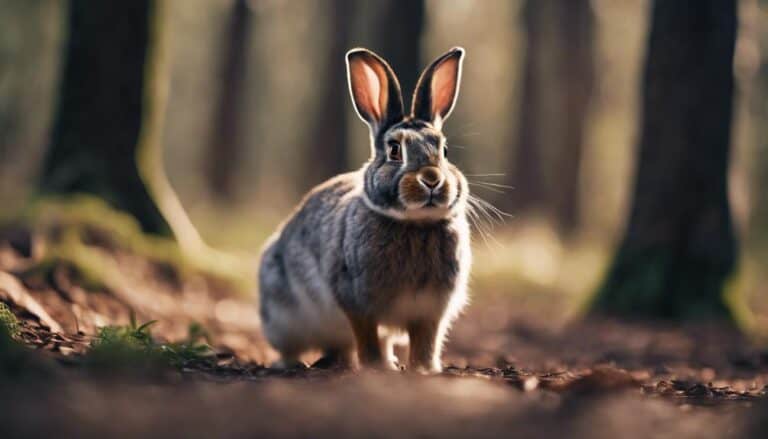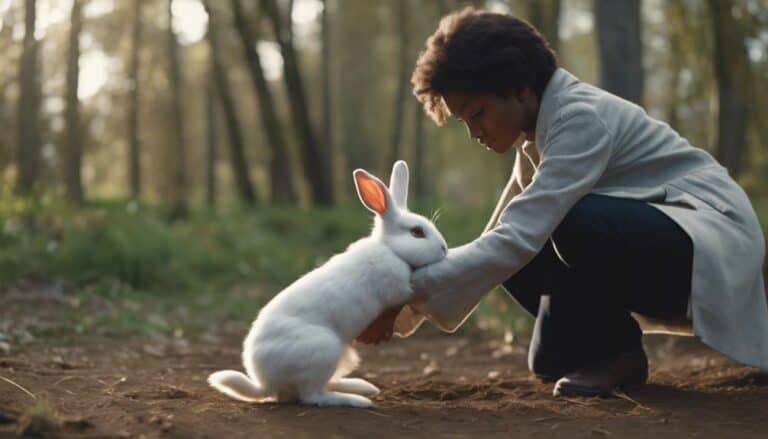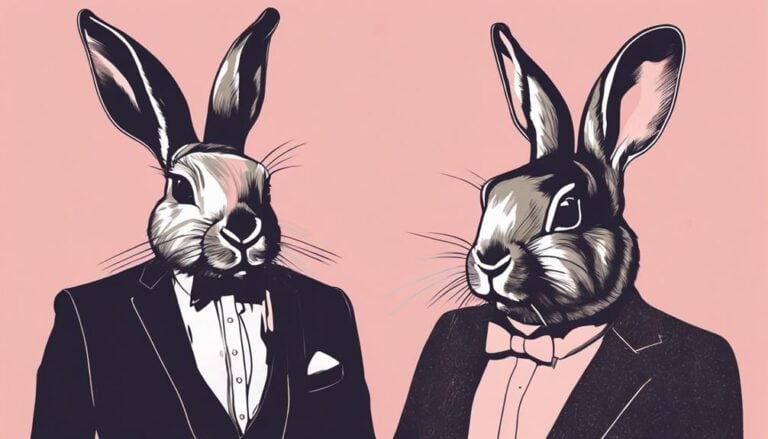Have you ever wondered if bunnies shake?
It's a common question among rabbit owners, and the answer might surprise you.
While a little shake here and there can be normal behavior for these fluffy creatures, there are certain instances where shaking could indicate an underlying issue that needs attention.
By understanding the various reasons behind bunny shaking and how to differentiate between harmless trembles and potential health concerns, you can guarantee your furry friend's well-being and take appropriate steps to address any discomfort they may be experiencing.
Contents
- 1 Key Takeaways
- 2 Reasons for Bunny Shaking
- 3 Normal Behavior Vs. Health Concerns
- 4 Emotional Triggers for Shaking
- 5 Environmental Impact on Bunny Shaking
- 6 Dietary Factors and Shaking
- 7 Signs of Discomfort in Bunnies
- 8 Shaking Due to Fear
- 9 Addressing Shaking in Pet Rabbits
- 10 Preventative Measures for Bunny Shaking
- 11 Does Shaking in Bunnies Indicate They Are Making Noise?
- 12 Frequently Asked Questions
- 13 Conclusion
Key Takeaways
- Bunny shaking is a form of communication expressing emotions and needs.
- Shaking can indicate health issues or normal behaviors like seeking attention.
- Environmental factors and diet play a role in bunny shaking.
- Understanding triggers and providing a stress-free environment can minimize shaking in bunnies.
Reasons for Bunny Shaking
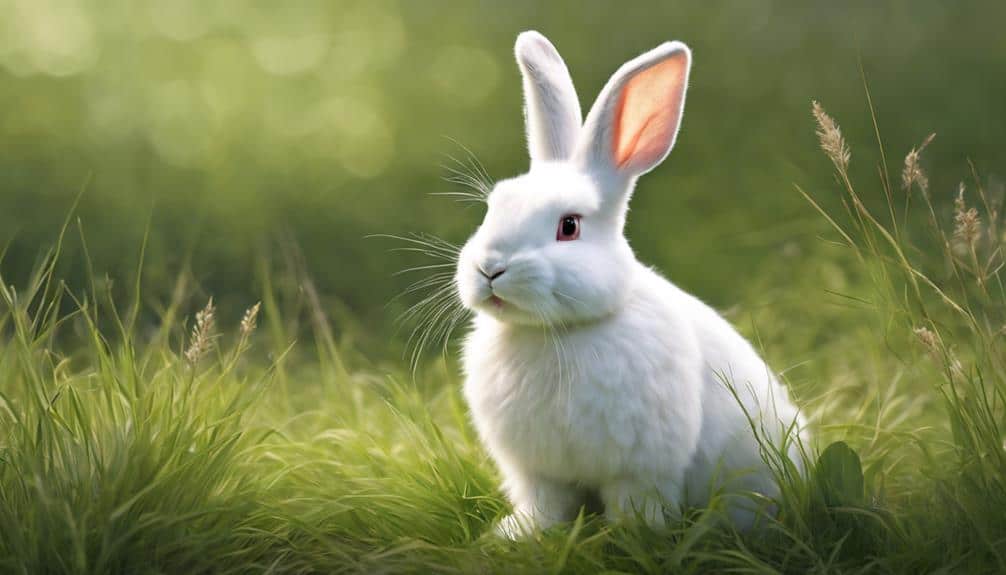
Bunny shaking serves as a communication tool for these small creatures, expressing a range of emotions and needs. While some shaking is normal, excessive shaking could signal underlying health issues. Ear mites, a common problem in bunnies, can cause discomfort leading to increased shaking. It's important to observe the context in which the shaking occurs to determine the cause. If your bunny shakes intensely or frequently, it might be time for a visit to the vet to rule out any potential health concerns.
Behaviorally, bunnies may shake after grooming to settle their fur, a natural instinct for them. Additionally, shaking can be a way for bunnies to seek attention or treats from their owners. By understanding the reasons behind bunny shaking, you can better cater to your furry friend's needs and guarantee their well-being. Remember, being attentive to your bunny's behavior can provide valuable insights into their health and happiness.
Normal Behavior Vs. Health Concerns
When differentiating between normal behavior and potential health concerns in bunnies, it's essential to observe specific signs and symptoms that may indicate underlying issues.
While it's common for a rabbit to shake in excitement after receiving treats or petting, noticeable shaking accompanied by teeth grinding, continual grunting, or a reluctance to be touched could indicate health problems such as an ear infection, exposure to something toxic, or seizures in rabbits.
In some cases, shaking can be a sign of a severe condition like heatstroke, poisoning, parasite infections, strokes, or gastrointestinal stasis. If your rabbit displays abnormal shaking, convulsions, loss of balance, or other concerning symptoms, seek immediate veterinary care.
Be cautious of toxic plants in your bunny's environment and take necessary precautions to prevent accidental ingestion. By being attentive to your rabbit's behavior and promptly addressing any unusual shaking, you can safeguard your pet's well-being and health.
Emotional Triggers for Shaking
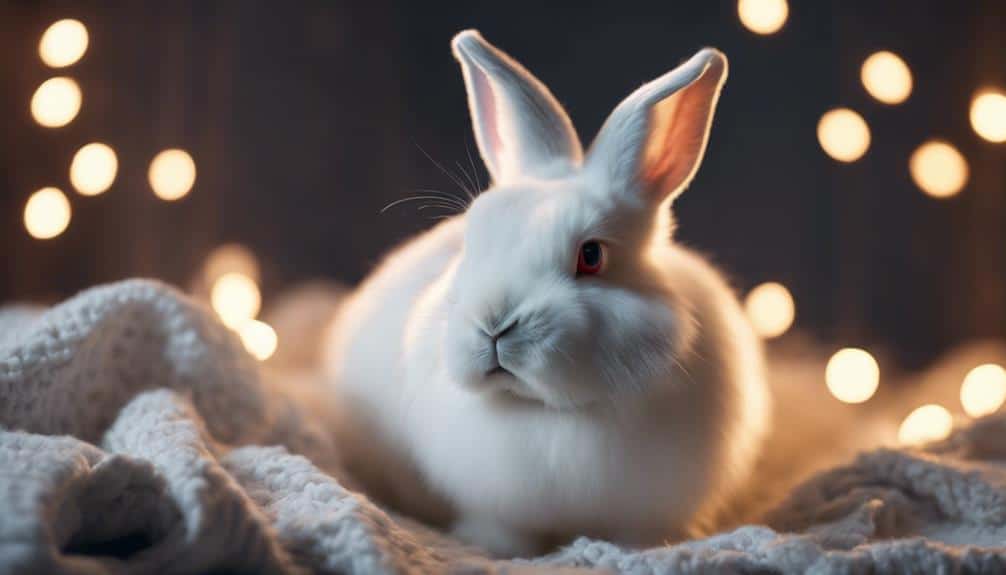
Shaking in bunnies can be triggered by various emotional responses such as fear, excitement, or a need for attention. When a bunny feels scared or anxious, their body language may include shaking as a way to express these emotions. Loud noises or sudden changes in their environment can also lead to shaking, indicating potential stress.
It's crucial to pay attention to your bunny's ear position and overall behavior to determine if the shaking is due to an emotional response. Chronic stress can manifest in bunnies through shaking, highlighting the importance of creating a calming and secure environment for them.
Additionally, bunnies seeking attention may resort to shaking as a form of communication, signaling their desire for interaction or care. Understanding these emotional triggers for shaking can help you provide the necessary support and address any underlying issues affecting your bunny's well-being.
Environmental Impact on Bunny Shaking
Temperature fluctuations and overstimulation are key factors that can trigger shaking behaviors in bunnies. Bunnies are sensitive creatures, and sudden changes in temperature or exposure to loud noises can lead to stress-induced shaking.
To guarantee proper rabbit care and reduce instances of shaking, it's essential to create a calm living environment for your furry friend. Environmental changes, such as loud noises or sudden movements, can be significant stressors for bunnies, resulting in shaking episodes.
By monitoring their habitat and adjusting it to minimize stressors, you can help prevent your bunny from experiencing unnecessary shaking. Remember, providing a quiet and peaceful space for your bunny is vital for their well-being.
Taking steps to create a stress-free environment can go a long way in ensuring that your bunny feels safe and secure, ultimately reducing the likelihood of shaking behaviors.
Dietary Factors and Shaking

Diet plays an important role in a rabbit's overall health and well-being, directly impacting their susceptibility to shaking behaviors. Rabbits often thrive on a diet high in fiber, with Timothy Hay being an essential component. Ensuring a proper balance of hay, fresh veggies, and limited fruits is critical to prevent health issues that can lead to shaking. Overfeeding rabbits with fruits and vegetables high in carbohydrates can upset their GI tract, potentially resulting in shaking. Food poisoning from spoiled or inappropriate foods is also a risk factor. Lack of hay in a rabbit's diet can lead to dental problems, causing pain and discomfort, which may contribute to shaking. Providing opportunities for dental wear through the diet is an important part of maintaining a rabbit's dental health and overall well-being. Remember, a well-rounded diet is key to keeping your bunny healthy and happy.
| Dietary Factors and Shaking | Impact |
|---|---|
| High in carbohydrates | Upsets GI tract |
| Food poisoning | Risk factor |
| Timothy Hay | Essential component |
Signs of Discomfort in Bunnies
If you notice your bunny exhibiting signs of discomfort, such as teeth grinding or continual grunting, it's important to pay close attention to their behavior and seek veterinary advice promptly. While it's normal for rabbits to shake their heads occasionally to groom themselves, persistent head shaking could indicate an issue that needs addressing. If your rabbit is shaking excessively, especially in conjunction with other signs like avoiding touch or flattened ears, it may be a cause for concern.
Teeth grinding in rabbits is another red flag that shouldn't be overlooked. This behavior can be a sign of pain or discomfort, suggesting that your bunny might have an underlying health issue that requires professional attention. Continual grunting is also a worrying sign, potentially indicating distress or pain. In such cases, it's critical to see a vet promptly to ensure your bunny's well-being.
Additionally, if your rabbit is shaking its head excessively, it might have an ear problem that needs to be addressed by a veterinarian. Taking prompt action can help identify and resolve any issues your bunny may be facing.
Shaking Due to Fear
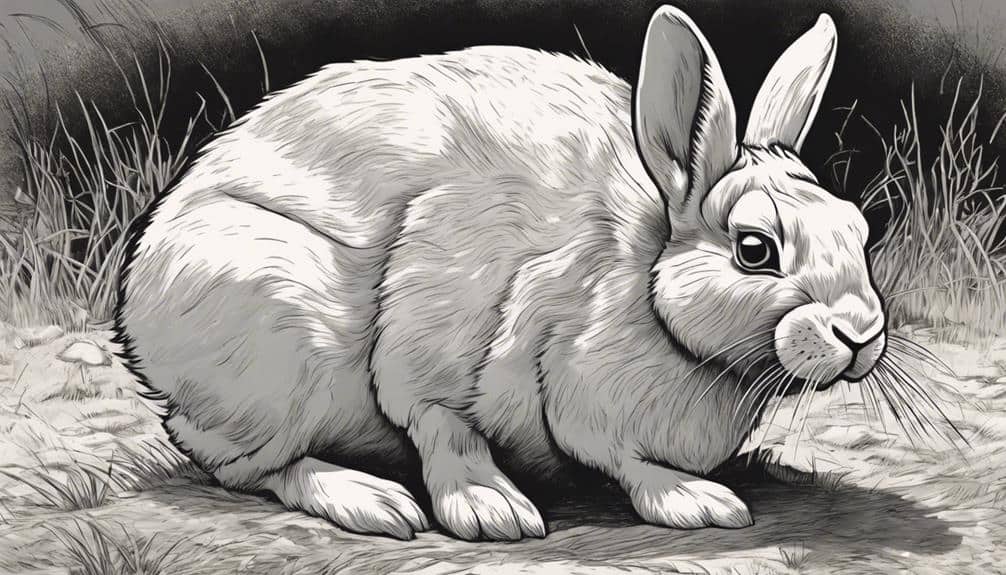
If your bunny starts shaking due to fear, it may be reacting to loud noises or sudden movements. This behavior can manifest as thumping, freezing in place, or exhibiting a rigid posture.
Understanding these fear-induced reactions is essential in providing the right comfort and care for your pet rabbit.
Fear-Induced Bunny Shaking
Fear-induced bunny shaking commonly occurs in response to loud noises, sudden movements, or unfamiliar environments, triggering a survival instinct in rabbits to signal danger. Signs of fear-induced shaking include a tense body posture, rapid breathing, and avoidance behaviors.
To help calm a shaking bunny experiencing fear, it's essential to provide a safe and quiet environment. Comforting gestures such as gentle petting and soothing words can reassure the rabbit and alleviate its anxiety. Understanding and responding to the bunny's fear-induced shaking with patience and empathy can go a long way in helping the rabbit feel secure and calm in its environment.
Understanding Bunny Behavior
When bunnies exhibit shaking behavior due to fear, it's important to understand the underlying causes and provide appropriate support to help the rabbit feel safe and secure.
If you see your rabbit trembling, especially in response to loud noises or unfamiliar surroundings, it may be experiencing fear-related shaking. This could manifest as thumping back legs or a rigid posture, signaling anxiety or discomfort.
Continuous trembling in rabbits might indicate persistent fear or stress, highlighting the need to address their emotional needs. By recognizing the context of your bunny's shaking behavior and taking steps to create a calm and reassuring environment, you can help alleviate their fears and make sure they feel secure and content.
Addressing Shaking in Pet Rabbits
Addressing shaking in pet rabbits involves understanding the various reasons behind this behavior, which can range from fear and excitement to health issues. Here is a breakdown of key points to think about:
- Emotional States: Rabbits may shake when experiencing fear, excitement, or seeking attention or treats. Understanding your rabbit's emotions can help decipher the cause of shaking.
- Grooming Behavior: Shaking after grooming is a natural behavior for rabbits to settle their fur. Observing when shaking occurs can provide insights into whether it's a grooming-related action.
- Health Concerns: Health issues such as ear infections, pain, or discomfort can lead to shaking in rabbits. If you notice persistent shaking, it's important to consult a veterinarian to rule out any underlying health problems.
- Environmental Factors: Temperature fluctuations or overstimulation can also induce shaking in rabbits. Ensuring a comfortable and calm environment for your pet can help minimize shaking episodes.
Preventative Measures for Bunny Shaking
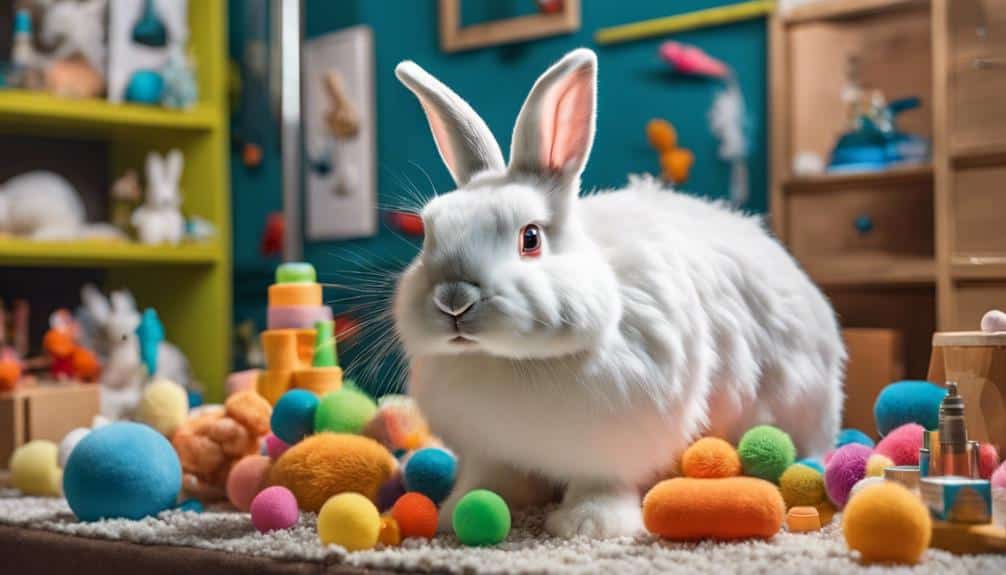
To prevent bunny shaking, make sure a clean and safe living environment is provided for your pet rabbits. Make certain they've access to grass hay for proper digestion and dental wear, reducing the risk of dental issues that may lead to shaking.
Regularly clean their living space to prevent reinfection from the habitat, especially for bunnies undergoing treatment for ear mites, a potentially life-threatening condition if left untreated. Remove any sharp objects from their vicinity to prevent injuries during potential seizures.
If you notice your pet rabbits shaking, consult a vet immediately. Watch for signs like ears open, which can indicate stress or discomfort, and seizures, which may require medical attention.
Providing a calm and stress-free environment can also help reduce episodes of shaking in bunnies. Stay vigilant, and seek professional help if you suspect any health concerns in your pet rabbits.
Does Shaking in Bunnies Indicate They Are Making Noise?
When it comes to noisy behavior in rabbits, shaking is typically not an indication of them making noise. Rabbits may shake due to fear, discomfort, or as a way to groom themselves. However, if accompanied by vocalizations, it could indicate distress or pain. It’s important to observe their behavior closely.
Frequently Asked Questions
What Does It Mean When a Bunny Is Shaking?
When a bunny is shaking, it can indicate stress indicators, health concerns, anxiety triggers, or behavioral issues. Consider environmental factors, proper handling techniques, and consult a vet for guidance in managing your bunny's well-being.
How Do You Calm a Shaking Rabbit?
To calm a shaking rabbit, softly speak, gently pet, and offer treats. Create a comforting environment with familiar surroundings. Avoid sudden movements and loud noises. Patience and gentle handling are key. Monitor triggers and stressors to reduce shaking.
Do Bunnies Shake When Scared?
When you observe rabbit behavior, notice their shaking response. Fear reactions in bunnies are common, linked to animal anxiety and rabbit emotions. A startled reflex can trigger shaking. Comfort and monitoring can help alleviate this.
What Does a Rabbit Spasm Look Like?
A rabbit spasm can involve rapid movement, muscle twitching, uncontrolled shaking, nervous behavior, involuntary spasms, and sudden jerking. These symptoms may vary in intensity and duration and can be triggered by various factors.
Conclusion
As you embrace your bunny in your arms, remember that their gentle shaking may symbolize their vulnerability and need for your care.
By understanding the reasons behind their trembling, you can guarantee their well-being and provide them with a safe and loving environment.
Stay vigilant, attentive, and proactive in addressing any signs of discomfort in your furry friend, as your compassion and dedication will make all the difference in their happiness and health.

